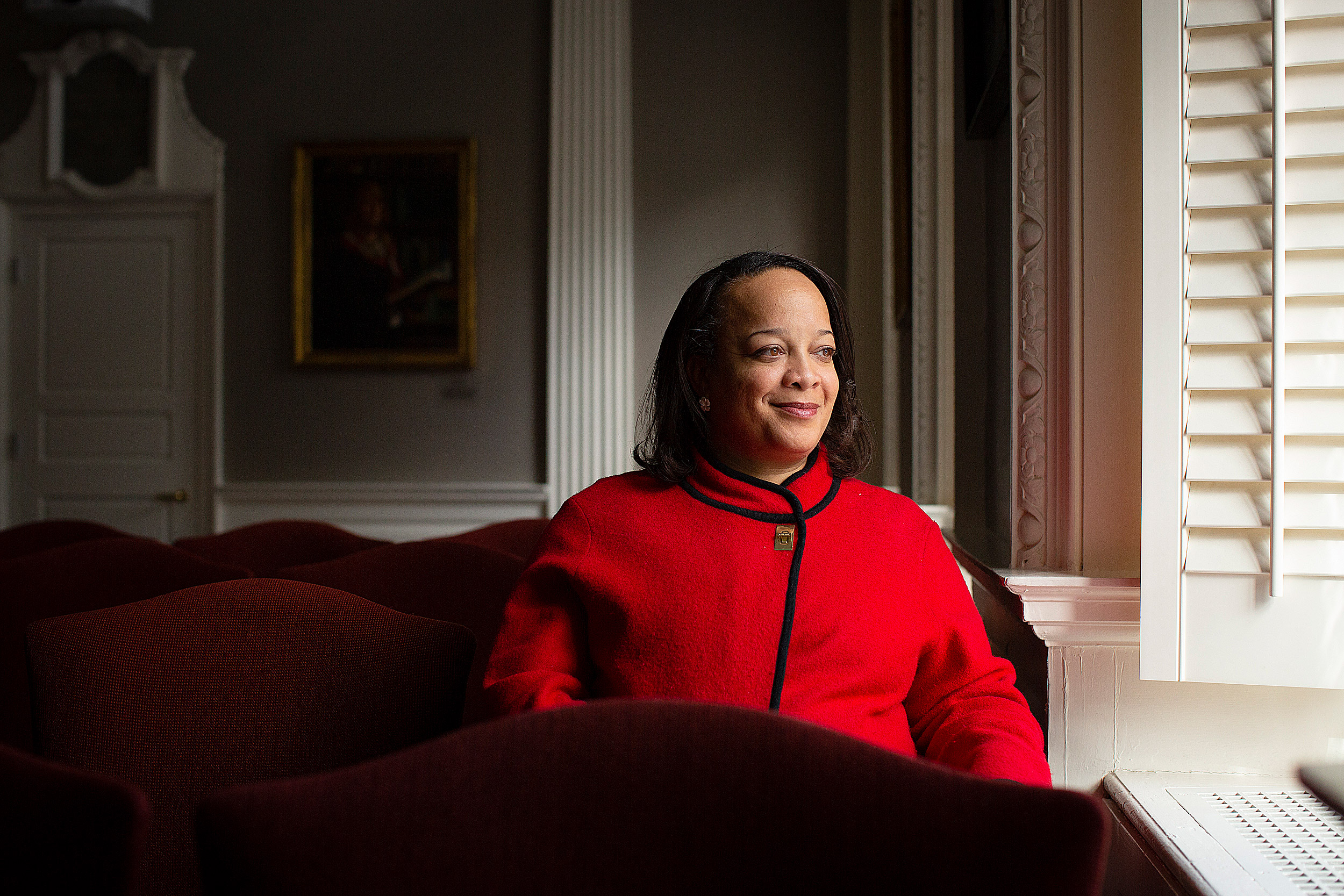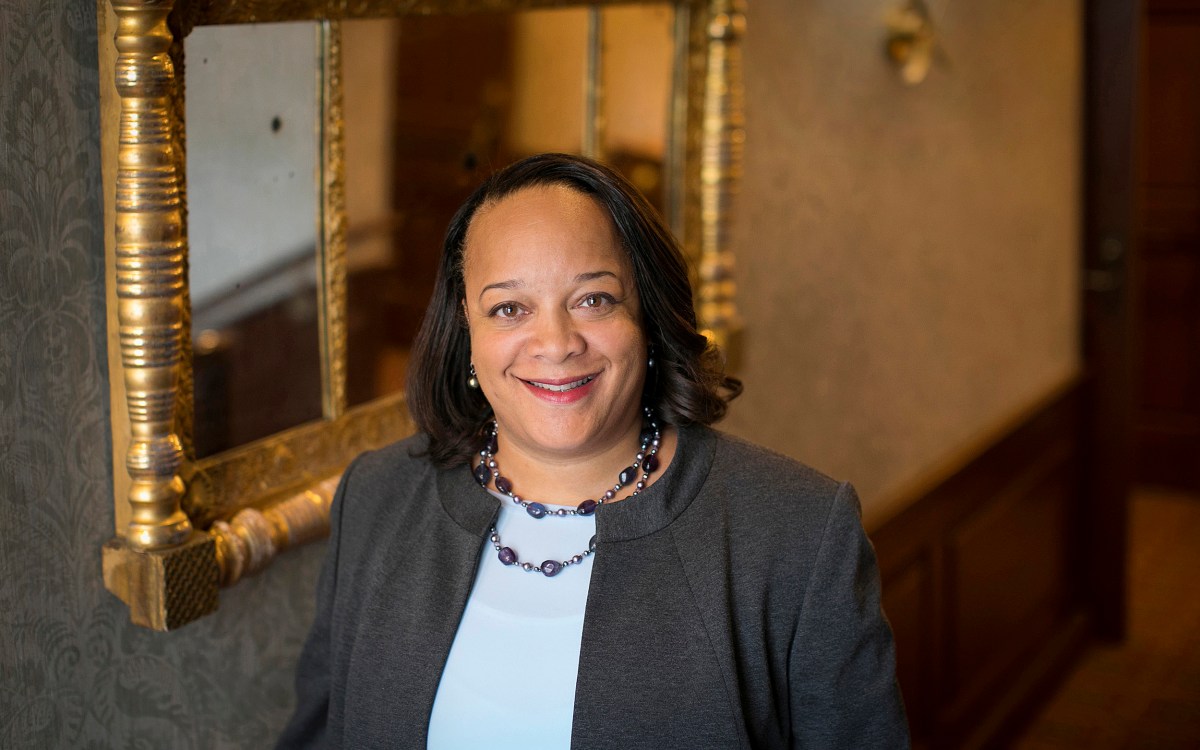
As Bridget Terry Long approaches her first-year anniversary as HGSE dean, she reflects on what led her to the role.
Stephanie Mitchell/Harvard Staff Photographer
On having — and being — a role model
Bridget Terry Long, HGSE’s recently appointed dean and the first African American in the position, seeks to inspire
In May of last year, Bridget Terry Long, A.M. ’97, Ph.D. ’00, was appointed dean of the Graduate School of Education (GSE), becoming the first African American to hold the position since the School was founded in 1920. She assumed the role in July.
A member of the faculty since 2000, Long, who is the Saris Professor of Education and Economics, is an economist who studies higher education and the transition from high school to college. It’s a topic that is close to her heart: Both of her parents delayed attending college — her mother until after several years of work and her father after serving in the Air Force — and they always spoke of education as the ticket to success.
The Gazette sat down with Long to talk about her first months on the job, the meaning of her appointment, and her aspirations as dean of the Ed School.
Q&A
Bridget Terry Long
GAZETTE: What have you learned so far at the helm of the School of Education?
LONG: I took this role because we are unified behind the mission of improving education, and I find that completely inspiring. As dean, I have the opportunity to work on this mission not only as an individual faculty member with my projects and so forth, but [also] with a team of people who are incredibly talented and hardworking and have a range of interesting ideas on how to improve education.
For me, the shift has been from thinking about my own portfolio of research and activities to thinking about an institution and the collective impact we can have. That has been exciting, but one puzzle is, how do you shift to telling stories of collective impact? How do you encourage the entrepreneurship that you absolutely want your faculty, staff, and students to have but also help them harness those ideas and implement them not as isolated events but to knit those things together for even greater impact?
GAZETTE: What challenges do you think the GSE faces to fulfill its mission of improving education?
LONG: I am still grappling with what can I do to support the institution and make sure that the engine continues to move forward. As a faculty member, I know the advantages of being able to do your own projects, but even research has changed, and now we have much more collaboration. This is really the story of the importance of diversity of thought in doing cutting-edge research — building on different perspectives and strengths to find new insights. But then the challenge is, how do you actually foster that into action? This also comes up in terms of developing deeper partnerships with the field. We have amazing alumni all over the world doing a range of things, from teaching to running nonprofits or foundations to starting businesses. That network can do astounding things, and if we add our faculty, staff, alumni, and other partners, if we can build those relationships and join those actions together, a greater impact will be possible. That’s kind of the larger question and goal: how to elevate the great work that is here and partner with others.
“If I can play some very small part in encouraging someone who is a student today — so they can see, number one, it’s possible, and number two, it’s not only possible, but you can have this role and still be yourself — I think that’s absolutely critical because we do look for the trailblazers.”
I also have jumped into learning things that are different about this job than what I’ve done previously; for example, thinking about communications and fundraising and space management. In many ways, all of those things are connected in this larger institution because they facilitate the great work and the mission of the organization, but universities and colleges and schools are complicated organizations. I’ve had to shift from running my data programs, which I do still love and somewhat miss, to the much more complex work of working with people and trying to understand their motivations, strengths, opportunities for growth — ultimately, getting us to work together to get things done.
GAZETTE: Your appointment as dean has been highlighted as a sign of the University’s commitment to diversify its leadership ranks. What does it represent for you to be the first African American dean of the Graduate School of Education?
LONG: It is hard for me to think about it, as an individual, but if I think about it from the outside perspective of what it might be like to see this — if I were a student or an educator — it does hit me how important this moment is. I can go back to when I was a graduate student. When I entered the Economics Department in 1995, I think my class size was around 40, and eight of us were women, which was the largest number of women they had had up to that point. I was the only African American in the class. If I go back to that time, and the doubts that I had, and the questions of whether I belonged here and how difficult it was, I realize just how meaningful it would have been for me to see an African American woman as the dean of the Graduate School of Education or the dean of the Faculty of Arts and Sciences or the dean of the School of Public Health or the dean of Radcliffe; that would have been mind-blowing.
I have to say I benefited as an undergraduate seeing Ruth Simmons, who was an administrator at Princeton when I was there and who eventually became the president of Brown University, the first African American president of an Ivy League university. She means the world to me. If I can play some very small part in encouraging someone who is a student today — so they can see, number one, it’s possible, and number two, it’s not only possible, but you can have this role and still be yourself — I think that’s absolutely critical because we do look for the trailblazers. I’m not the first to rise to a high level of academic leadership, and I take inspiration from those before me, but I hope others will see me as yet another example that will inspire them.
GAZETTE: You’re an economist who studies access to higher education. How does the research you do relate to your family history?
LONG: For most researchers, we’re inspired and motivated by some question that came about in our childhoods — some puzzle that we’re trying to understand — and for me, that had to do with education. In my own family, I can see the number of opportunities education has brought, but this wasn’t a question of whether a person graduated from high school. My father is one of seven and my mother is one of five. All of my aunts and uncles graduated high school. As a kid, I instead noticed the patterns of who went to college versus not, and that’s what made the difference: college access and college success. So that’s what I chose to study. When I thought about issues of inequality and poverty, it was clear to me that access to higher education was crucial. I wanted to study why is it that people make different decisions, what are the barriers and challenges, and what are potential solutions to increase access and success.
GAZETTE: You have said that the big question that has always been on your mind is whether higher education is a leveler or if it exacerbates inequality. Can you tell us how this question came up and what the role of the Ed School is in answering it?
LONG: My parents always spoke about the benefits of education, and the hopes and promises and opportunities that education could create. I’ve certainly been a beneficiary of that, but as I got older, I started looking at communities around me that didn’t have access to the wonderful public schools I attended, and I started to wonder that it’s not just a matter of hard work; it is not just a matter of parents who love you. So many people work hard, so many people have families that love them and support them, and they don’t end up having the opportunities I was exposed to or going to the many wonderful schools that I was able to attend. I realized that some of what I was benefiting from, beyond just my hard work, was because of enormous sacrifices made by my parents and many supports and mentors I was fortunate to have. Even with hard work, others are shut out of opportunities to truly excel. The question is who really has access to the upper echelons of education.
If you were born in a certain neighborhood, and your only choice is a certain school, and that poor education is actually holding you down, then education might actually not be a ticket to opportunity. Seeing it again and again is incredibly frustrating to me. I was brought up to believe hard work pays off, but the frustration is that sometimes it doesn’t. I have dedicated much of my research, and now, this deanship, to trying to understand how to counter and how to make sure access to high-quality education is available for all. That it can be not just a leveler, but a ticket to all kinds of success in many different dimensions.
GAZETTE: What would be your greatest accomplishment as a dean?
LONG: I think the first rule of being dean — or any leader for that matter — is not to think about yourself but instead to think about the success of those around you and the institution you serve. And at this point in my career, I take that very seriously. What I’m trying to do is use the talent and many resources of this institution — which I count in ways other than money — to make meaningful impacts on the outcomes of all learners. If I can help to elevate the research of my faculty and students and deepen and make our engagements with the field more effective, then I will feel good about what I’ve done as dean. I have some burgeoning ideas of specific goals and initiatives that will help to illustrate exactly what I mean by increasing our impact, but I’ll save those for a future day after I have a few more months under my belt.
This interview has been condensed and edited for length and clarity.






